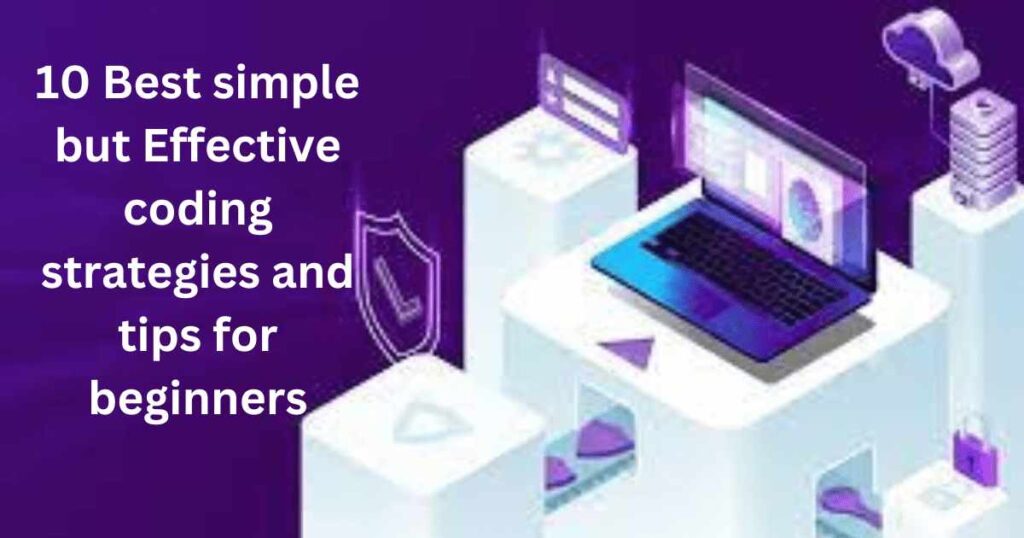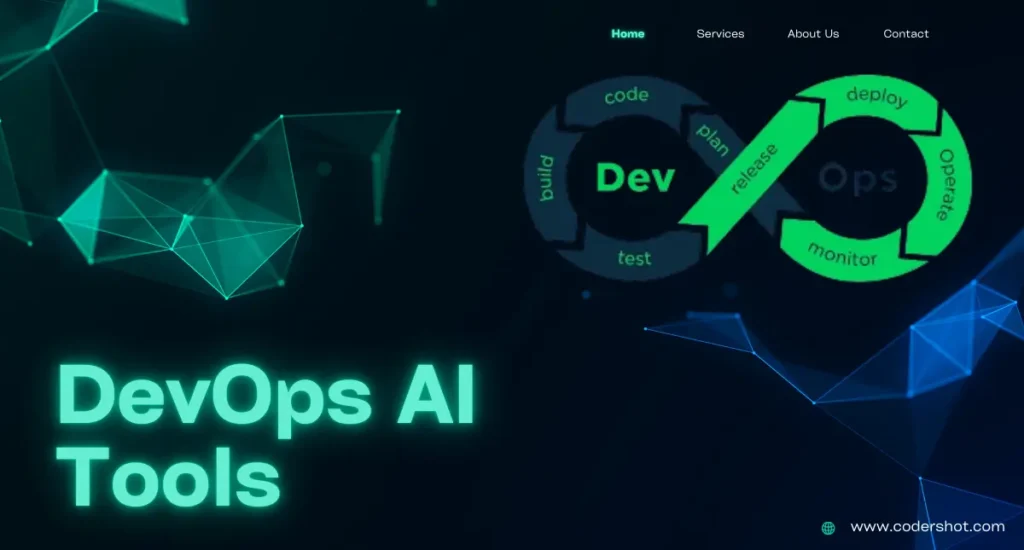Take your coding to the next level with these 10 best practices and coding strategies for beginners in 2023.

Welcome to our guide on the 10 best effective coding strategies for beginners in 2023. As a beginner, it can be overwhelming to navigate the world of coding and programming. However, by developing effective coding strategies, you can improve your efficiency and productivity as you learn.
Table of Contents
ToggleIn this article, we will go through some of the most important coding strategies that you should consider implementing in the new year.
1. Setting clear goals:
One of the most important coding strategies for beginners is setting clear goals. This means identifying what you want to achieve with your coding and setting specific, measurable purposes to guide your learning.
For example, if you could set a goal to learn a new programming language or to build a specific project. Having clear goals will help you stay focused and motivated as you learn.
It also helps to break down the project into manageable tasks and to track progress throughout the development process. Clear goals can be set by defining the problem that the code is intended to solve, determining the specific requirements of the project, and creating a plan or roadmap to guide the development process.
Additionally, it is important to identify any potential obstacles or challenges and create goals to overcome them.
Read also:- Is there any age limit to learn coding?
2. Breaking down larger tasks:
Another effective coding strategies is breaking down larger tasks in coding is the process of breaking large and complex tasks into smaller, more manageable pieces. . This will make it easier for you to understand and tackle the task at hand, rather than feeling overwhelmed by the whole project.
For example, instead of trying to build an entire application at once, break it down into smaller parts such as user registration, login, and data display.
Here are some ways to break down larger tasks in coding:
- Identify the main components of the task: The first step is to identify the main components of the task and divide them into smaller, more manageable pieces.
- Create a plan: After identifying the main components, create a plan outlining the steps required to complete the task. This will help you stay managed and concentrated.
- Use abstraction: Abstraction is the process of hiding the details of a task and focusing on high-level concepts. This can make the task easier to understand and develop.
- Use modular programming: Modular programming is the process of dividing a program into smaller, independent modules. This can make it easier to test and maintain the code.
- Use version control: Use version control to track changes to the code and keep a history of the development process. This can help you revert to an earlier version of the code if needed.
By breaking down larger tasks in coding, you can make the development process more manageable and efficient.
3. Creating a comfortable workspace:
Creating a comfortable and conducive workspace is also an important coding strategy for beginners. This means ensuring that you have a comfortable chair, good lighting, and a clean and organized work area. Having a good workspace can help you focus and increase your productivity.
It is important for maintaining focus and productivity while coding. Here are a few tips to help create a comfortable workspace:
- Make sure your chair and desk are at a comfortable height and that your computer monitor is at eye level.
- Make sure you have good lighting and reduce glare on your monitor.
- Keep your workspace clean and arranged to lower distractions.
- Take breaks every hour or so to stretch and move around.
- Personalize your workspace with plants, photos, or other items that make you feel good.
- Use noise-canceling headphones to reduce distractions from noise in the background.
- Keep a water bottle and snacks nearby to stay hydrated and nourished.
- Use a comfortable keyboard and mouse to reduce strain on your hands and wrists.
- And if possible, choose a comfortable room temperature.
4. Staying organized:
Another effective coding strategies is staying organized. This means keeping your code, notes, and resources in a clear and structured format. For example, you could use comments, indentation, and clear variable and function names to make your code more readable and maintainable.
Additionally, using a project management tool can help you keep track of your tasks and deadlines.
It is an important strategy for coding as it helps to reduce distractions and keep your work flowing smoothly. Here are a few tips for staying organized while coding:
- Use clear, descriptive naming conventions for your files, folders, and variables.
- Use comments in your code to explain what different sections of your code are doing.
- Use a code editor or integrated development environment (IDE) that has built-in features for organizing your code, such as code folding and syntax highlighting.
- Use version control software, such as Git, to keep track of changes to your code over time and collaborate with other developers.
- Break your code into small, manageable chunks, and write functions or modules to perform specific tasks.
- Keep your code well-formatted and consistent to make it easier to read and understand.
- Keep track of tasks and bugs using a project management tool or to-do list.
- Regularly review your code and make sure it is optimized for performance and maintainability.
By following these tips, you can increase your productivity and reduce the amount of time you spend searching for and fixing errors in your code.
Read also:- Fake coding websites
5. Using version control:
Using version control is a must-have coding strategies for beginners.
- Version control systems, such as Git, allow developers to track changes to their code, collaborate with other developers, and easily revert to previous versions.
- Git is the most widely used version control system, it’s free and open-source.
- Using version control from the beginning of your coding journey will help you to keep track of your progress, roll back to previous versions, collaborate with others on the same codebase, and make it easy to switch to new projects or jobs.
- Online hosting services for Git, like GitHub, GitLab, and Bitbucket, provide additional features such as issue tracking, pull requests, and code review.
Additionally, version control enables collaboration and teamwork on a codebase.
6. Collaborating with others:
Another effective coding strategies is collaborating with other programmers.
Collaborating with other programmers can be a very effective coding strategy, as it allows you to learn from others, share ideas, and work together to solve problems. Here are a few benefits of collaborating with other programmers:
- Sharing knowledge: By working with others, you have the opportunity to learn new skills and techniques that you might not have otherwise discovered.
- Different perspectives: Collaborating with others can help you see problems from different angles, which can lead to more creative and efficient solutions.
- Faster problem-solving: When you work with others, you can divide the workload and tackle problems together, which can help you solve them faster.
- Improved code quality: Collaborating with others can help you improve the quality of your code by catching errors and suggesting improvements.
- Increased motivation: Collaborating with others can help you stay motivated and engaged, as you can share your progress and get feedback on your work.
- Tools for Collaboration: There are many tools available for collaborating with others such as Git, GitHub, GitLab, Trello, Asana, etc.
- Pair programming: This is a method of programming where two programmers work side by side on one computer, collaborating on the same codebase. It is a great way to learn from others, improve your skills, and get feedback on your work in real-time.
Overall, collaborating with other programmers can be a valuable experience that can help you improve your coding skills and work more efficiently.
7. Keeping up with new developments:
Another important coding strategies is keeping up with new developments in the coding world. This means staying informed about new programming languages, tools, and frameworks that are being released.
Keeping up with new developments in the coding world is an important aspect of being a successful coder. Here are a few ways to stay current:
- Follow industry leaders and experts on social media and through their blogs or podcasts.
- Attend conferences, meetups, and other networking events to learn about new technologies and trends.
- Join online communities and forums related to your field of interest.
- Read articles and tutorials from reputable sources to learn about new tools and techniques.
- Experiment with new technologies and programming languages on your own time to gain a deeper understanding of them.
- Participate in hackathons, coding challenges, and other competitions to stay sharp and gain experience working with new technologies.
- Take a class or course to learn new skills.
- Keep an open mind and be willing to adapt to new technologies as they arise.
It is important to note that, these are not only ways to stay current, but there are also many other ways to stay current in the coding world, and you can choose the ways that work best for you.
Additionally, keeping up with new developments will help you stay current and increase your employability.
8. Taking breaks and practicing self-care:
Yes, taking regular breaks is an effective strategy for maintaining focus and productivity while coding. Sitting in front of a computer for long periods of time can be mentally and physically taxing, so it’s important to take breaks to rest your eyes, stretch your body, and give your mind a break.
Some self-care strategies that can help while coding include:
- Taking short breaks every hour or so to stand up, stretch, and move around.
- Going for a walk or doing some light exercise during lunch breaks.
- Practicing mindfulness or meditation helps reduce stress and increase focus.
- Eating healthy snacks and staying hydrated throughout the day.
- Getting enough sleep the night before to ensure you are well-rested.
- Using noise-canceling headphones to help reduce distractions.
- Setting boundaries around your work time to prevent burnout.
- And most importantly, listen to your body and mind, if you feel tired or stressed, take a break.
It’s also important to note that self-care doesn’t have to be limited to time away from the computer. You can also practice self-care by making sure your workspace is comfortable and personalized to your liking, and by setting realistic goals for your work sessions.
Additionally, practicing self-care such as exercise, healthy eating, and getting enough sleep can help you stay energized and focused.
Read also:- 10 Best Tips for Improving Your Logic Building Skills in Coding in 2023
9. Continuously learning and experimenting:
Continuously learning and experimenting is a key strategy for beginners in coding because it allows them to build their skills and knowledge in a hands-on, practical way. Here are a few ways to approach continuous learning and experimentation:
- Practice coding regularly, even if it’s just for a few minutes a day. Consistency is key.
- Set specific learning goals and work towards them. For example, you could aim to learn a new programming language or a specific programming concept.
- Experiment with different coding projects and challenges. This will help you learn new skills and apply them in a real-world context.
- Try to solve problems on your own before seeking help. This will help you build your problem-solving skills and confidence.
- Don’t be afraid to make mistakes. Learning from mistakes is an important part of the coding process.
- Collaborate with others. Join a coding group or mentor someone who is less experienced than you.
- Learn from resources such as books, tutorials, and online courses.
- Be curious and always try to learn new things to improve your skills.
It’s also important to note that learning to code is not just about learning the syntax of a language, it’s also about learning how to think like a programmer and learning how to approach and solve problems in a logical and systematic way.
10. Learn Data Structures and Algorithms
Learning data structures and algorithms is considered to be a powerful coding strategies for improving one’s coding skills and overall understanding of computer science.
some benefits to learning data structure and algorithm:-
- Learning data structures and algorithms can improve your understanding of how to organize and manipulate data efficiently.
- It can help you write more efficient and effective code.
- It is fundamental knowledge in computer science.
- It is a common topic in technical interviews in the software industry
- It can help you to understand how to approach and solve problems in a logical way
- It can help to increase your ability to think abstractly and come up with efficient solutions
- It can help you to better understand the performance characteristics of your code
- It can help to gain a deeper understanding of the inner workings of programming languages and computer systems.
Together, data structures and algorithms form the foundation of many computer programs and software systems. Learning these concepts can help a developer write more efficient and effective code, and can also help prepare for technical interviews in the software industry.
Conclusion
In conclusion, these 10 effective coding strategies for beginners in 2023 will help you improve your efficiency and productivity as you learn to code. By setting clear goals, breaking down larger tasks, staying organized, and keeping up with new developments, you will be able to improve your coding skills and achieve your goals in the new year. Remember to take breaks, practice self-care, and continuously learn and experiment to stay current and motivated.
Read also:- Top 7 Best Coding challenges Websites in 2023








